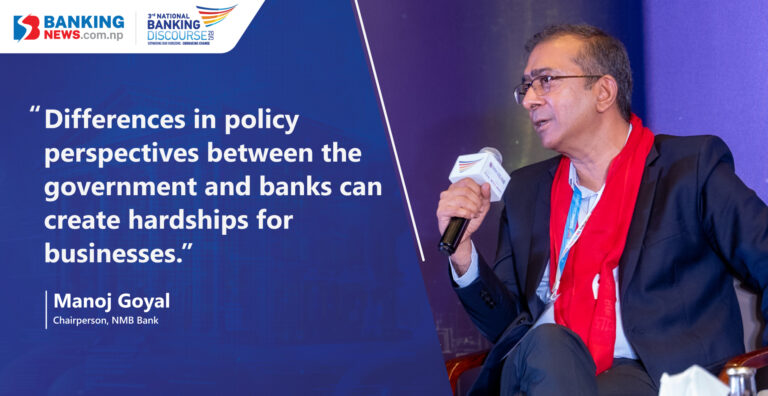Kathmandu – In the early days of Nepal’s banking system, there was a prevailing belief that banks should be entirely state-controlled, with no participation from the private sector. However, the landscape has changed dramatically. Today, both government-owned and private banks are actively providing services across the country.
Speaking at the Third National Banking Discourse 2025, NMB Bank Chairperson Manoj Goyal reflected on the sector’s evolution. He noted that in the past, most investors joined the banking sector purely for returns, with little motivation to bring about meaningful change. “Very few people entered banking with the intention of reforming the system from within,” he said.
He credited Nepal Rastra Bank (NRB) for initiating key reforms, stating that the sector has steadily moved toward professionalism. As a result, banking has become a preferred career path, offering strong employment opportunities and attracting talent from various fields.
However, Goyal acknowledged that recent debates around the banking sector’s credibility—particularly related to credit disbursement issues—have triggered unnecessary controversy. While some believe that credit flow has been restricted due to investor behavior, isolated incidents should not define the entire banking system. He stressed the need to evaluate the impact of credit availability on the business community and discourage generalized criticism, which could undermine confidence and impact capital flow.
He further elaborated that differences in policy perspectives between the government and banks can create hardships for businesses, but this is not because banks are intentionally discouraging lending. For example, if a project cannot sustain high interest rates, banks are forced to proceed with caution. In such scenarios, financial institutions may need to take appropriate actions, which are sometimes misunderstood as aggressive or negative behavior.
Goyal emphasized that recent media narratives suggesting that “banks are charging excessive interest” fail to capture the broader context. “Banks operate strictly within regulatory frameworks, and highlighting only negative aspects while ignoring their contributions does a disservice to the sector,” he said. He called on the media to also highlight the positive roles played by banks in Nepal’s economic growth.
On the relationship between the government, NRB, banks, and financial institutions, Goyal noted it is as intertwined as nails and flesh—one cannot function effectively without the other. He argued that a lack of coordination among these entities fuels misconceptions in the market, particularly the misbelief among business owners that banks always charge excessive interest.
In reality, Goyal said, banks are compelled to act if borrowers fail to meet repayment obligations. He also pointed out that many entrepreneurs fail to properly assess project feasibility, leading to disputes. Since economic conditions and environments constantly evolve, it is natural for occasional disagreements to arise—but coordination among all stakeholders is essential to avoid systemic issues.
Drawing from his dual experience as both an investor and a banker, Goyal concluded that while roles may shift over time, the common objective remains the same: contributing to national productivity and economic development. As long as this shared goal is upheld, challenges can be navigated without confusion or conflict.



 About Us
About Us
Comment